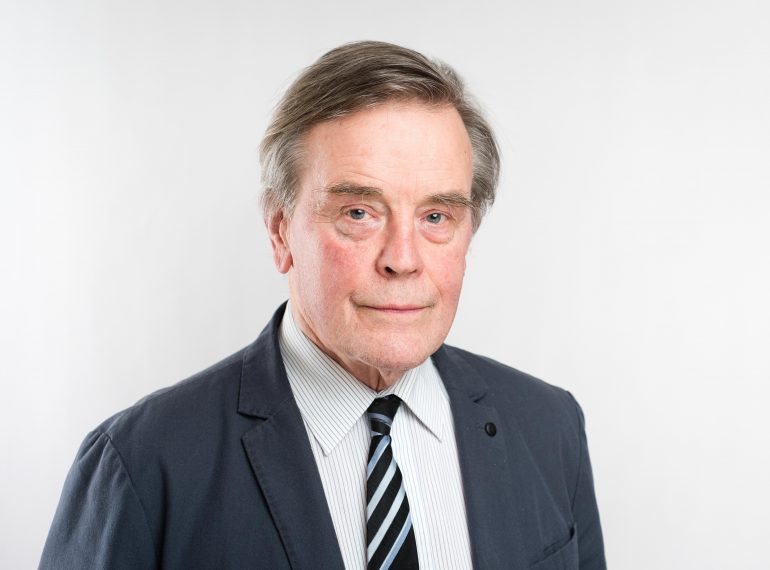
I am 79. I am the oldest of three children. I was at QE from 1954–1961, the end of the E H Jenkins era. [Jenkins was Headmaster from 1930–1961].
My parents married in April, 1939, and my father spent most of the first seven years of marriage in the army. He was highly intelligent, but I think his lengthy spell in the forces (as Lance Corporal, since his then left-wing views meant he would not apply for a commission) drained him of ambition and drive. He taught at Tottenham Technical College until retirement. My mother had plenty of drive, but her formal education had been limited by lack of funds and a shameful but widespread prejudice against higher education for women.
We lived successively in a flat in Muswell Hill, a semi in Southgate and a detached house in Cockfosters. Money was always tight, to the extent that my mother went back to work in January 1954, to my intense dismay. Working mothers were widely regarded – and certainly in Cockfosters – as women whose greed outweighed their maternal instincts. She did a valuable job as a medical secretary for many years but, through almost all my schooldays, I naively felt that it was a serious stigma – for example, when we could not do an exchange with a young German.
My parents valued education above most other potential blessings. We read a great deal at home, and parental targets for us were pretty clear.
Having ‘passed’ the 11+, I was guided by my parents to QE rather than East Barnet Grammar (just down the road). This was largely because it was an all-boys school, which was thought more conducive to diligence and serious study. Entry to QE demanded an interview by Jenkins with a parent present. He was a short man with bristling moustache and matching personality. He left you in no doubt that, even if selected, you were probably quite unworthy of such an honour. I felt sure I had failed when unable to give him the meaning of ‘ancillary’. “What,” he feigned to storm, “Ancilla, Ancilla,” a maid servant? Where’s your Latin, my son?” Not I fear in the scope of my studies at De Bohun Primary School. Jenkins was perhaps the most colourful of the memorable dramatis personae of the Masters common room. I use the theatrical term because there was a range of acting talent across the classrooms.
I want to consider the quality of the School in the latter 1950s, how it fitted with me and the personal factors which underlie my assessment of QE and its influence upon me. The last first.
I enjoyed a relatively successful education over seven years. It culminated in a major open scholarship to Cambridge, which had been my target. I love(d) sport, however mediocre many of my performances, and QE was set up for a wide range of sports by the standards of the 1950s, in most of which I took part. It encouraged debating, which I thoroughly enjoyed and which, in large measure, I carried with me into my subsequent life. I hope I do not sound grossly conceited. I provide that summary because I look back from the standpoint of one who was generally well suited to QE, enjoyed the life it offered and derived obvious benefits from its education. Some others of my contemporaries did not share my overall enjoyment. They chafed perhaps at the strict discipline and felt we were living in he past, which, to some extent, we were.
There was no ethnic diversity. The boys came from a limited catchment area, largely within what is now the Borough of Barnet. There was nothing comparable to the near-universal urge to learn that characterises the School today. The values inculcated by QE overlapped with, but were by no means identical to, those that inform a QE education today. E H Jenkins had served in the Navy during the Great War, and his views on life, hence on the standards that should prevail in his school, had not changed significantly since. On the whole, they suited me, a keen reader then of G A Henty and John Buchan, but they would need a drastic revision if Jenkins were to lead the School today.
There were around 450 boys, a third of today’s quota, and I suspect we were more aware of those outside our own age-group. We enjoyed mimicking the posturing of prefects and the jingoism of the School Captain.
Looking back, I think QE was living, to a significant degree, on past, mainly pre-war, glories, when it was moved by the thrusting 30-year-old EHJ, in a blaze of energy, from its cramped, if historic, quarters to the present site, became the best athletics school in the country and, locally at least, a highly regarded academic institution which, more importantly, produced young gentlemen.
By 1954, Jenkins was, I now think, treading water and, with him, a large part of the senior staff, most of whom had seen war service. They could be very entertaining, treasuring witty repartee rather more than a scholarly forty minutes with Virgil. The wonderfully irreverent Rex Wingfield (‘Winky’ to all) was effortlessly diverted to first-hand accounts of the fighting in Normandy which produced a best-selling book.
J H Winter, related the story of the Seven Years War from the same script as in 1934 and reminisced about Jack Hobbs. There was dear Jack Covington who would welcome the most crass Sixth Form contribution to a discussion of Wordsworth with “Well, that’s a most interesting, indeed original approach”, albeit one which would condemn you to disaster in an A-level exam. History lessons frequently involved dictated notes, which enraged my father.
Whilst QE contained some very good scientists, the arts/humanities dominated its output of university candidates, quite the reverse of the position today. In a staff of 30-plus, there were, I recall, six full-time classics masters in my final year. My experience of post O-level teaching was of Modern Languages, English and Latin, but I believe the same lack of new thinking at a senior level applied to other subjects, though Sid Clarke’s progressive impact on Chemistry teaching was clearly an exception. Bright and innovative younger teachers seemed to move on quite rapidly, though that may have been simply the opportunity for promotion.
To summarise, Jenkins’ standards and values still dominated QE in his final years. The School ran smoothly and quite successfully, as regards academic results, but it badly needed the kind of shake-up that it eventually received at the hands of Eamonn Harris in the mid-eighties.
Why then, despite such a critical assessment of QE at that stage in its long history, do I still feel real gratitude for my formative years there?
As I said at the outset, I gratefully recognise that, whatever my perception of its shortcomings, it worked for me. I appreciated the latitude we were given as to what and how to study within the constraints of an exam curriculum. I respected the vast stores of knowledge of German literature and culture which I could tap from K L Woodland (universally ‘Klew’), when I took the initiative to do so. I liked the clear setting of targets by Gilbert Smith as to exams and university, and the challenges he posed as regards workload. I enjoyed the competitive environment which surrounded you from day one, not least because it taught me the sobering lesson that some others were far more talented than me, a lesson reinforced later by the experience of university.
Just as important, QE fostered freedom of speech and the principle that every opinion had a right to be heard, if not respected. Debating directly promoted such ideas, but they were encouraged in the classroom, too. Nobody and nothing was ‘cancelled’.
Perhaps, above all else, despite its austere exterior, QE was fun. For me that is encapsulated in memories of Eric Shearly, roaring in mock rage and always with a smile on his face. Masters could, in almost every case, ‘take a joke’, however stern their demeanour.
After five or so years at QE, I rather fancied myself as a mimic of Jenkins, both as to voice and vocabulary. On one occasion, whilst waiting for the master to arrive, I put on a brief performance : “Tyler, my son, You did the decent thing. That was a thoroughly decent show.” As I concluded, I sensed a marked drop in room temperature. A similar voice behind me added: “Not bad, Farrer, but needs a bit of polishing up.” The fearsome Jenkins turned away and walked off. He had a sense of humour.
At the end of my final term, for the Underne House Social, I wrote a parody of that year’s school play The Strong are lonely, which concerns a Jesuit community in a Spanish colony in South America threatened with takeover by the Spanish state: a perfect model for satirising QE. Each of the Fathers was an obvious skit on a master at QE. I played the Abbot, as Jenkins, with EHJ a few feet away in the front row. He didn’t bat an eyelid and applauded vigorously at the end. It was an image of QE that I took away with me and still recall with undiminished clarity.
Yes. It never approached the standards of QE today. But it was fun.
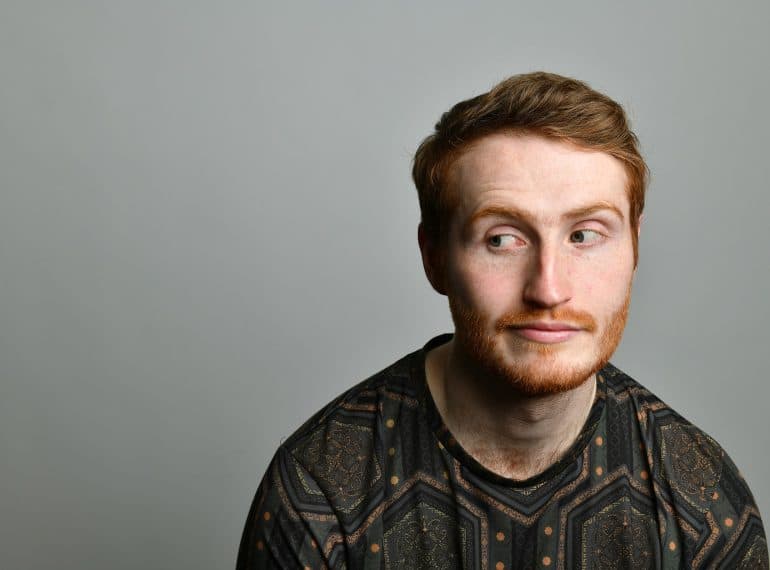
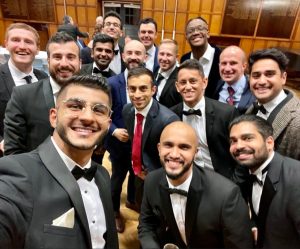 Alister, who was among the guests at this term’s OE Association Dinner, therefore feels a special impetus to encourage today’s pupils if they hold similar interests.
Alister, who was among the guests at this term’s OE Association Dinner, therefore feels a special impetus to encourage today’s pupils if they hold similar interests.
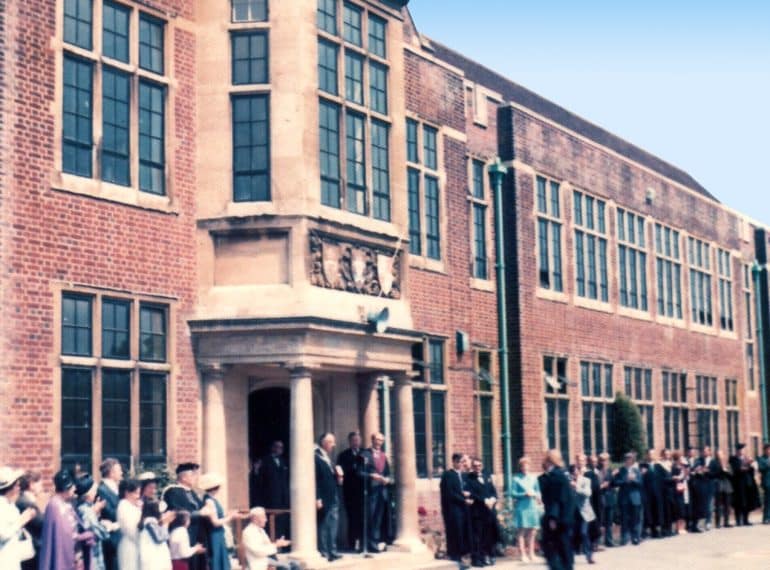
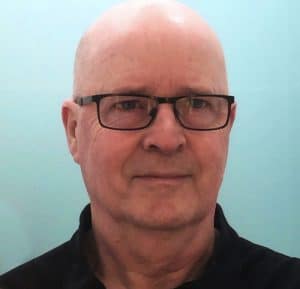 “I stayed on after my A-levels in 1972 to take Cambridge entrance exams in the autumn. I was, I think, the youngest in my year, so I wanted to take a year out,” he said. “In the end, I stayed the whole academic year 1972–73 as School Captain: it was the 400th anniversary and there was so much to do! Prefects were responsible for much of the discipline and organised all school break times and the junior assembly. I had to combine school work with part-time paid work (I was from a one-parent family and on free school meals). I worked in the doubles bar at the Red Lion pub and remember ‘Tiger’ Timson [Classics teacher Percival Timson] coming in for a drink each evening before catching the bus home – double White Horse whisky with Malvern Water.
“I stayed on after my A-levels in 1972 to take Cambridge entrance exams in the autumn. I was, I think, the youngest in my year, so I wanted to take a year out,” he said. “In the end, I stayed the whole academic year 1972–73 as School Captain: it was the 400th anniversary and there was so much to do! Prefects were responsible for much of the discipline and organised all school break times and the junior assembly. I had to combine school work with part-time paid work (I was from a one-parent family and on free school meals). I worked in the doubles bar at the Red Lion pub and remember ‘Tiger’ Timson [Classics teacher Percival Timson] coming in for a drink each evening before catching the bus home – double White Horse whisky with Malvern Water.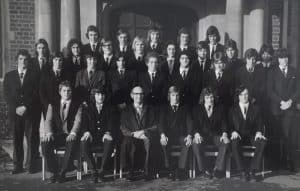 Iain was a keen sportsman. He was captain of the athletics team and played rugby on the left wing in the First XV, also playing for the county in both sports. He was the Borough of Barnet schools 100 metres sprint champion for two years. “My time of 11.2 seconds was a record that stood for several years, I think.”
Iain was a keen sportsman. He was captain of the athletics team and played rugby on the left wing in the First XV, also playing for the county in both sports. He was the Borough of Barnet schools 100 metres sprint champion for two years. “My time of 11.2 seconds was a record that stood for several years, I think.”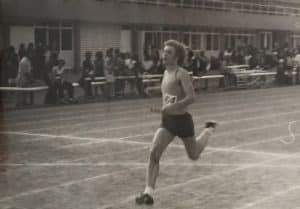 After Iain finally handed over the School Captain’s mantle to Maxwell Ball, who took over in the Autumn Term of 1973, he went on to his own English Literature degree at Warwick. After that, he worked in arts marketing at the Royal Opera House. “I then became a graphic designer, working for theatre companies, which has been my career for the past 40 years.” He is creative director of his own company, Kean Lanyon Ltd.
After Iain finally handed over the School Captain’s mantle to Maxwell Ball, who took over in the Autumn Term of 1973, he went on to his own English Literature degree at Warwick. After that, he worked in arts marketing at the Royal Opera House. “I then became a graphic designer, working for theatre companies, which has been my career for the past 40 years.” He is creative director of his own company, Kean Lanyon Ltd.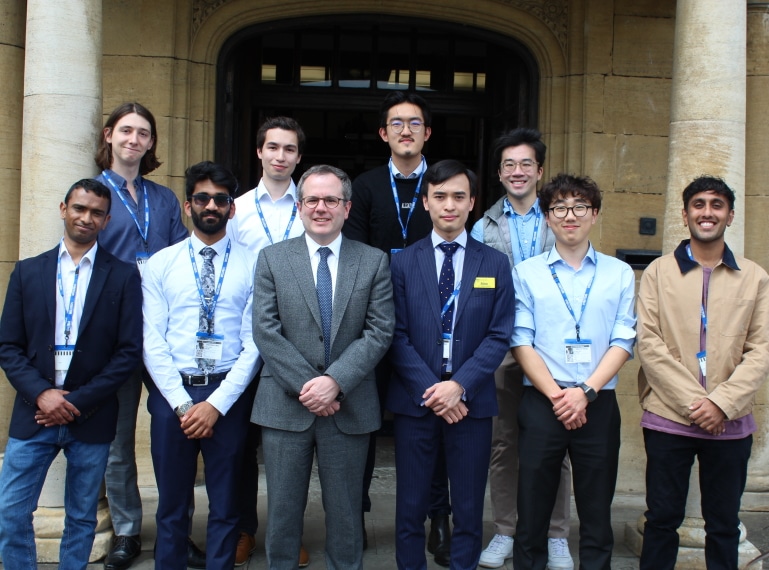
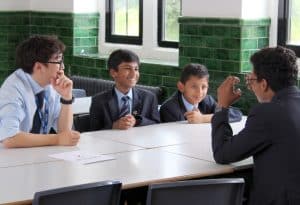 First stop was a trip down memory lane with a visit to 7B’s form time, where Languages teacher Marie-Jo Jacquin is still the form tutor, just as she was in their day back in 2009. They then did a careers ‘speed-dating’ workshop in which they introduced their roles and industries, and the key skills and routes into it, to small groups of Year 8 boys.
First stop was a trip down memory lane with a visit to 7B’s form time, where Languages teacher Marie-Jo Jacquin is still the form tutor, just as she was in their day back in 2009. They then did a careers ‘speed-dating’ workshop in which they introduced their roles and industries, and the key skills and routes into it, to small groups of Year 8 boys.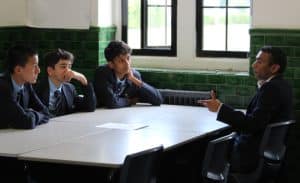 In common with the visit of Max Curtis, mentioned in the Headmaster’s introduction, the visit began with an OE – in this case, Alexander Ng – reaching out to the Headmaster.
In common with the visit of Max Curtis, mentioned in the Headmaster’s introduction, the visit began with an OE – in this case, Alexander Ng – reaching out to the Headmaster.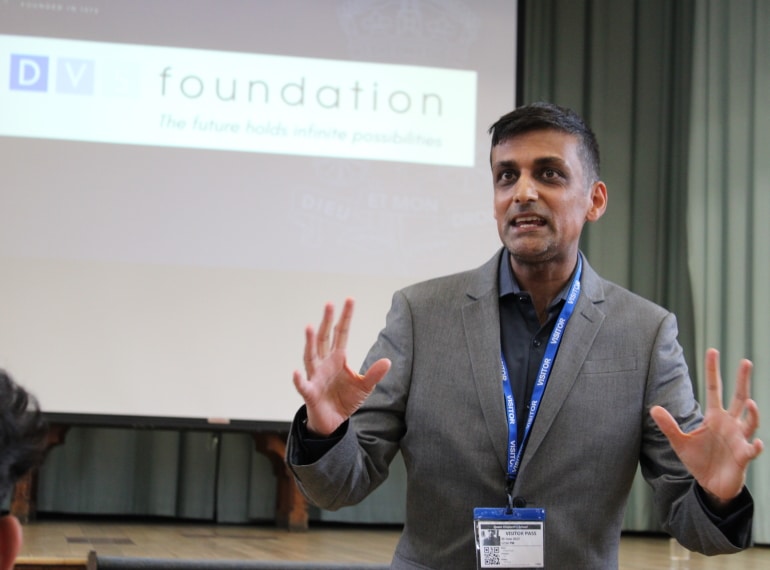
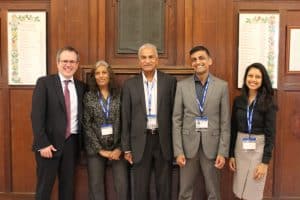 Together with his parents, Dhiru and Rami, Priyan (OE 1991–1998) visited the School this term to present DVS Foundation Awards to ten of the current Year 12s. These aim to promote a virtuous circle of motivation and success, together with kindness. And the awards are only one facet of the family’s philanthropic work: the foundation’s focus is on education, food insecurity and healthcare, in both the UK and East Africa.
Together with his parents, Dhiru and Rami, Priyan (OE 1991–1998) visited the School this term to present DVS Foundation Awards to ten of the current Year 12s. These aim to promote a virtuous circle of motivation and success, together with kindness. And the awards are only one facet of the family’s philanthropic work: the foundation’s focus is on education, food insecurity and healthcare, in both the UK and East Africa.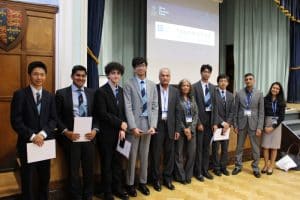 Introducing its work in a special assembly, he explained that the foundation supports other organisations as well as operating its own programmes. These programmes include not only the awards programme, which was launched in 2021, but also its WhyOhYou personal development programme. QE plans to get involved in WhyOhYou in the autumn.
Introducing its work in a special assembly, he explained that the foundation supports other organisations as well as operating its own programmes. These programmes include not only the awards programme, which was launched in 2021, but also its WhyOhYou personal development programme. QE plans to get involved in WhyOhYou in the autumn.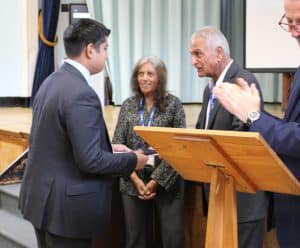 The Headmaster thanked him and his parents for their visit: “We are really grateful to the family for their generosity in awarding each of our ten prize winners a £100 Amazon voucher, and I know that the whole Year 12 year group are, in turn, grateful for the great advice Priyan passed on to them. I look forward to working with the foundation through WhyOhYou in the coming months: my thanks go to Rupal Shah for her work coordinating the scheme.”
The Headmaster thanked him and his parents for their visit: “We are really grateful to the family for their generosity in awarding each of our ten prize winners a £100 Amazon voucher, and I know that the whole Year 12 year group are, in turn, grateful for the great advice Priyan passed on to them. I look forward to working with the foundation through WhyOhYou in the coming months: my thanks go to Rupal Shah for her work coordinating the scheme.”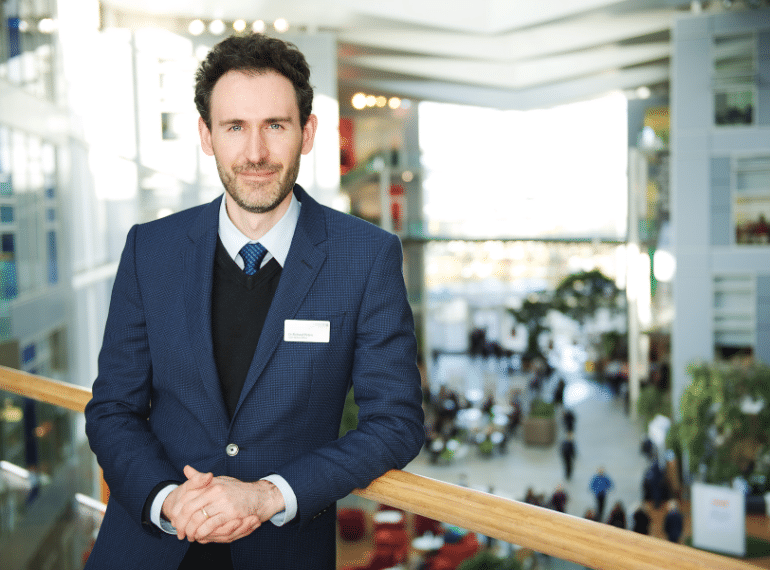
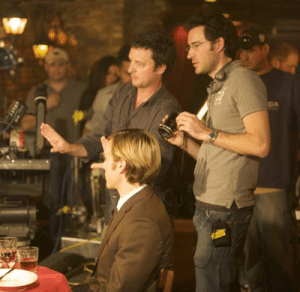 He then successfully trained as a doctor – albeit punctuated by a two-year spell in America pursuing his passion for making film and TV programmes – and later began a career specialising in occupational medicine.
He then successfully trained as a doctor – albeit punctuated by a two-year spell in America pursuing his passion for making film and TV programmes – and later began a career specialising in occupational medicine.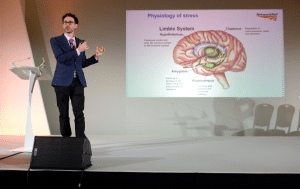 He already had a nascent interest in matters medical, wanting at that stage to become a dentist, yet decided to study Music to degree level, taking his Music Performance AS in Year 12 before leaving QE to complete his A-levels and then in 1999 going to Birmingham’s acclaimed Music department, where Edward Elgar had first held the Chair.
He already had a nascent interest in matters medical, wanting at that stage to become a dentist, yet decided to study Music to degree level, taking his Music Performance AS in Year 12 before leaving QE to complete his A-levels and then in 1999 going to Birmingham’s acclaimed Music department, where Edward Elgar had first held the Chair.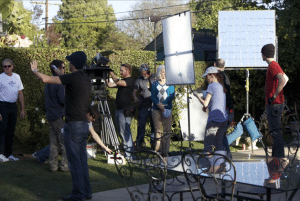 He retains the enthusiasm that drove him a decade ago to spend two years in Los Angeles making films and working on TV shows. “While I don’t have much spare time, I did manage to combine medicine and media – two of my passions! – when I produced and co-wrote a first-aid training film for Network Rail: it was a fictional drama to raise awareness of the importance of first-aiders for saving lives.”
He retains the enthusiasm that drove him a decade ago to spend two years in Los Angeles making films and working on TV shows. “While I don’t have much spare time, I did manage to combine medicine and media – two of my passions! – when I produced and co-wrote a first-aid training film for Network Rail: it was a fictional drama to raise awareness of the importance of first-aiders for saving lives.”